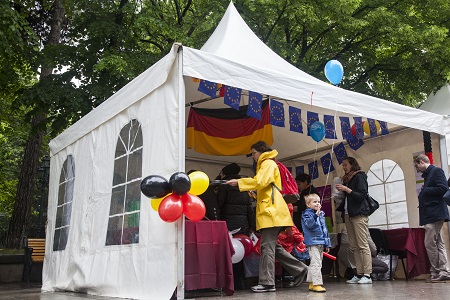What is Germany’s role in conflict resolution in Georgia?

What is Germany’s role in conflict resolution in Georgia?
From next year Germany will play a significant role in Georgia’s security once it takes over as chair country of the Organisation for Security and Cooperation in Europe (OSCE).
This week Georgia’s Deputy Foreign Minister David Dondua held high-level meetings in Berlin to discuss Germany’s role as OSCE chair country in 2016 with respect to Georgia’s occupied territories and regional security.
The Georgian official briefed German authorities and diplomats about current security issues in Georgia, as a portion of its soil was occupied by Russia.
Dondua’s Berlin agenda on December 16 and 17 included meetings with the Special Representative of Germany for OSCE Chairmanship 2016, German Federal Chancellor's Deputy Adviser on Foreign and Security Policy, head of the German Foreign Ministry’s working group for future OSCE chairmanship and Germany’s Ambassador at large for the Caucasus and Central Asia.
Meetings were also held at leading German research centres and non-governmental organisations.
All of the meetings focused on Germany’s future role in conflict resolution in Georgia once it becomes OSCE chair country.
Georgia’s Deputy Foreign Minister informed the German side about Russia installing barbed-wire fences alongside Georgia’s breakaway regions. Dondua also said fundamental human rights were violated in Georgia’s Russian-occupied regions as citizens had their movement limited and in the Gali region schools were forbidden to teach in Georgian.
Dondua also talked about Russia’s attempts to annex Georgia’s breakaway regions Abkhazia and Tskhinvali (South Ossetia) as it continued signing different so-called strategic agreements with these regions.
Dondua said international involvement was very important in settling Russian-fuelled conflicts in Georgia.
The OSCE officially closed its observer mission in Georgia after the Russia-Georgia war in the summer of 2008.
The OSCE Monitoring Mission in Georgia was established in Tbilisi in 1992. Its initial mandate was to promote constructive negotiation between Georgian and breakaway Tskhinvali sides. The mandate also covered human rights, freedom of media and economic and environmental dimensions.
However after the 2008 war Russia rejected extending the Mission's mandate and it ended.
 Tweet
Tweet  Share
Share